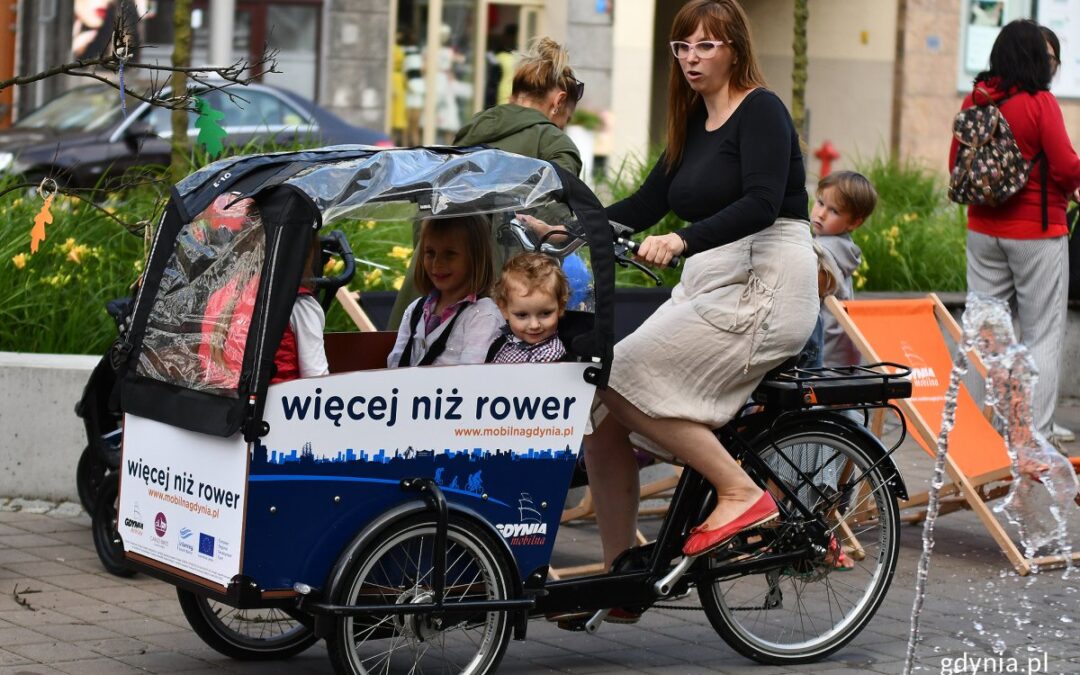The Polish city of Gdynia has received two awards for its innovative sustainable transport programmes, including a scheme offering residents free rental and subsidies for purchase of electric cargo bikes.
Gdynia, which is located on Poland’s northern Baltic coast, is “trail blazing” and a “major success story”, according to an EU-funded Cycle Logistics project.
Next up, the Legacy Award. For its exceptional #SustainableMobility work over the past nearly-two-decades of being involved in @CIVITAS_EU, the 'Legacy Award 2021' goes to… 🥁🥁🥁@MiastoGdynia! Congratulations to Gdynia🇵🇱! 🥳 pic.twitter.com/eFo3UWmkNd
— CIVITAS Initiative (@CIVITAS_EU) October 20, 2021
The recently completed “Cargo bikes in Gdynia” scheme won first prize in the sustainable transport category for large cities in the Polish climate ministry’s “City with Climate” award, which promotes green solutions for cities.
And Gdynia also received a “Legacy Award” from CIVITAS, the EU’s flagship network of cities dedicated to sustainable urban mobility, for the improvements it has made in urban mobility, including cargo bikes as well as new bus lanes and trolleybuses.
The CityChangerCargoBike programme was implemented for three years from September 2018, with funding from the EU’s Horizon 2020 scheme. It allowed Gdynia residents to borrow electric cargo bikes for free and also offered subsidies for their purchase.
These proved popular for various activities, according to the city’s website: from picnics, family outings and taking children to school, to deliveries, shopping and as a mobile library.
Stawiamy na ekologiczne środki transportu: trolejbusy, autobusy i wreszcie rowery cargo. Dzięki wypożyczalni gdynianie mogli poznać zalety tych praktycznych pojazdów. Uruchomiliśmy też miejski program umożliwiający ich zakup z 50% dofinansowaniem.#rowerowe3miasto #3cthashtagday pic.twitter.com/tE03UFO0UV
— Gdynia (@MiastoGdynia) June 15, 2021
“We are very pleased that Gdynia’s experiences in popularising electric cargo bikes have been recognised by the ministry,” said Jakub Furkal of the city’s department for bicycle communication development.
Gdynia also won second prize in its category last year, after purchasing 30 environmentally friendly trolleybuses and improving its waste management system.
Cargo bikes “have great potential and can successfully replace cars in many situations – including logistics. They can carry a load up to 100 kg – a fact that more and more courier firms are making diligent use of,” Furkal added.
Marek Łucyk, Gdynia’s deputy mayor responsible for sustainable development, said that since joining the CIVITAS network “we as a city have had the great opportunity to learn, develop and implement innovative solutions, as well as to share our knowledge on sustainable mobility”.
“This has increased the quality and accelerated the process of our city’s development towards a green and people-friendly city,” he added.
“We constantly strive to provide new and better mobility solutions and enhance citizens’ sustainable ways of life and we are happy that this has been acknowledged by the CIVITAS Initiative”.
As well as providing access to cargo bikes, the city also emphasised education, reports Cyclelogistics.eu, the website of the EU-funded City Changer Cargo Bike project, which aims to promote cargo bikes as a solution to the challenges of urban mobility.
'@MiastoGdynia is leading the way in using #CargoBikes as a sustainable alternative to 🚗
Through education, subsidies & cargo🚲 rental schemes the 🇵🇱 city is a winner in providing 🟢 & people-friendly solutions within the #CityChangerCargoBike project 👏
Read more 👇
— ECF (@EuCyclistsFed) November 26, 2021
Gdynia published a children’s book in which animals and their friends use cargo bikes for a day out at the beach, as well as running a municipal information campaign and book sharing system for older potential users.
The city now plans to increase the number of bikes available in residential districts as well as continuing to offer the scheme at schools, public libraries and public buildings, said Dorota Gajda-Kutowińska of the city’s Sustainable Mobility Unit, quoted by Citylogistics.eu.
Noting that similar systems also now operate in other Polish cities including Kraków, Bydgoszcz and Słupsk, she added that “more and more Poles are interested in cargo bikes – as evidenced by the many enquiries on our Facebook group Cargo Bike Poland and during the annual Polish Cargo Bike Festival, which is hosted by a different city each year.”
Main image credit: Michał Puszczewicz/Gdynia.pl

Ben Koschalka is a translator, lecturer, and senior editor at Notes from Poland. Originally from Britain, he has lived in Kraków since 2005.



















